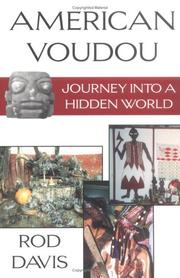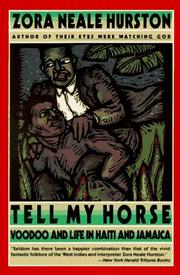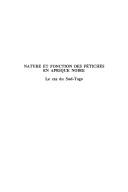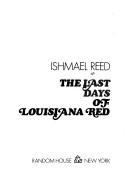| Listing 1 - 10 of 26 | << page >> |
Sort by
|

ISBN: 1283924528 1574414887 0585275017 9780585275017 1574410814 1574410490 9781574410495 9781574414882 9781574410815 Year: 1998 Publisher: Denton, Tex. University of North Texas Press
Abstract | Keywords | Export | Availability | Bookmark
 Loading...
Loading...Choose an application
- Reference Manager
- EndNote
- RefWorks (Direct export to RefWorks)
Voudou (an older spelling of voodoo)-a pantheistic belief system developed in West Africa and transported to the Americas during the diaspora of the slave trade-is the generic term for a number of similar African religions which mutated in the Americas, including santeria, candomble, macumbe, obeah, Shango Baptist, etc. Since its violent introduction in the Caribbean islands, it has been the least understood and most feared religion of the New World-suppressed, out-lawed or ridiculed from Haiti to Hattiesburg. Yet with the exception of Zora Neale Hurston's accounts more than a half-century ago and a smattering of lurid, often racist paperbacks, studies of this potent West African theology have focused almost exclusively on Haiti, Cuba and the Caribbean basin. American Voudou turns our gaze back to American shores, principally towards the South, the most important and enduring stronghold of the voudou faith in America and site of its historic yet rarely recounted war with Christianity. This chronicle of Davis' determined search for the true legacy of voudou in America reveals a spirit-world from New Orleans to Miami which will shatter long-held stereotypes about the religion and its role in our culture. The real-life dramas of the practitioners, true believers and skeptics of the voudou world also offer a radically different entree into a half-hidden, half-mythical South, and by extension into an alternate soul of America. Readers interested in the dynamic relationships between religion and society, and in the choices made by people caught in the flux of conflict, will be heartened by this unique story of survival and even renaissance of what may have been the most persecuted religion in American history. Traveling on a criss-cross route from New Orleans across the slave-belt states of Mississippi, Alabama and Georgia, dipping down to Miami where the voudou of Cuba and the Caribbean is endemic, and up to New York where priests and practioners increase each year, Rod Davis determined to find out what happened to voudou in the United States. A fascinating and insightful account of a little known and often misunderstood aspect of African-American culture, American Voudou details the author's own personal experiences within this system of belief and ritual, along with descriptions and experiences of other people, ranging from those who reject it entirely to ardent practitioners and leaders. Davis also places voudou in a broad context of American cultural history, from slavery to the Civil Rights Movement, and from Elvis to New Age. Current interest in voudou is related, in part, to the arrival of large numbers of people into the United States from the Caribbean, especially Cuba. Blacks in that country were able to maintain the African religion in a syncretic form, known as santeria. The tensions that have arisen between Cubans and African Americans over both the leadership and the belief system of the religion is discussed. Davis raises questions and offers insight into the nature of religion, American culture, and race relations. The book contains an extensive bibliography for further reading and a glossary of voudou terms for readers unfamiliar with the subject.
Dissertation
Year: 2022 Publisher: Liège Université de Liège (ULiège)
Abstract | Keywords | Export | Availability | Bookmark
 Loading...
Loading...Choose an application
- Reference Manager
- EndNote
- RefWorks (Direct export to RefWorks)
Dans le cadre des différents projets de réhabilitations progressives des places traditionnelles déjà menés et en cours, ma question de recherche visera d'une part à déterminer l'influence du vodùn sur les réflexions qui ont nourri le projet architectural des rénovations des places vodùn de la ville de Porto-Novo.
Porto-Novo --- Bénin --- Ville --- Paysage --- Patrimoine africain --- Rénovation --- vodùn --- vaudou --- Ingénierie, informatique & technologie > Architecture

ISBN: 0060916494 Year: 1990 Publisher: New York (N.Y.): Harper and Row
Abstract | Keywords | Export | Availability | Bookmark
 Loading...
Loading...Choose an application
- Reference Manager
- EndNote
- RefWorks (Direct export to RefWorks)
Folklore --- Esoteric sciences --- Jamaica --- Haiti --- Voodooism --- -Voodooism --- -Vaudou --- Vodun --- Voodoo (Religion) --- Voodou --- Vooduism --- Voudon --- Voudooism --- Voudouism --- Voudoun --- Vudu --- Cults --- Description and travel. --- Description and travel --- -Haiti --- Vodou --- Vaudou

ISBN: 2738425089 9782738425089 Year: 1994 Volume: *1 Publisher: Paris : L'Harmattan,
Abstract | Keywords | Export | Availability | Bookmark
 Loading...
Loading...Choose an application
- Reference Manager
- EndNote
- RefWorks (Direct export to RefWorks)
Fetishism --- Fétichisme --- Fetishes (Ceremonial objects) --- -Voodooism --- -Vaudou --- Vodun --- Voodoo (Religion) --- Voodooism --- Voodou --- Vooduism --- Voudon --- Voudooism --- Voudouism --- Voudoun --- Vudu --- Cults --- Ceremonial objects --- Vodou --- -Fetishes (Ceremonial objects) --- Fétichisme --- Africa [Sub-Saharan ] --- Vaudou
Book

ISBN: 9780955481734 0955481732 Year: 2010 Publisher: London Soul Jazz
Abstract | Keywords | Export | Availability | Bookmark
 Loading...
Loading...Choose an application
- Reference Manager
- EndNote
- RefWorks (Direct export to RefWorks)
This work features a combination of photography, cultural and historical analysis and background and anthropology to explore the Haitian Kanaval. It also includes a set of oral histories by participants in this unique and strange event
Street theater --- Voodoism --- Photography, Artistic --- Théâtre de rue --- Vaudou --- Photographie artistique --- Pictorial works --- Ouvrages illustrés --- Haiti --- Haïti --- fotografie --- straatfotografie --- voodoo --- Gordon Leah --- carnaval --- politiek --- fotografie en politiek --- antropologie --- etnografie --- 77.041 --- 77.071 GORDON --- Théâtre de rue --- Ouvrages illustrés --- Haïti --- Vodou --- Vodun --- Voodoo (Religion) --- Voodooism --- Voodou --- Vooduism --- Voudon --- Voudooism --- Voudouism --- Voudoun --- Vudu --- Pictorial works. --- Cults --- Theater

ISBN: 0394491882 Year: 1974 Publisher: New York (N.Y.): Random House
Abstract | Keywords | Export | Availability | Bookmark
 Loading...
Loading...Choose an application
- Reference Manager
- EndNote
- RefWorks (Direct export to RefWorks)
Cookery (Okra) --- -Private investigators --- -Voodooism --- -Vaudou --- Vodun --- Voodoo (Religion) --- Voodooism --- Voodou --- Vooduism --- Voudon --- Voudooism --- Voudouism --- Voudoun --- Vudu --- Cults --- Gumshoes --- Investigators, Private --- Private detectives --- Private eyes --- Private I's --- Police, Private --- Detectives --- Cooking with okra --- Okra --- Cooking (Vegetables) --- Fiction --- Use in cooking --- Berkeley (Calif.) --- -Fiction --- Cooking (Okra) --- Private investigators --- Vodou --- Vaudou
Book
ISBN: 1283868296 0252094468 9780252094460 0252037294 9780252037290 9781283868297 9780252078767 0252078764 Year: 2013 Publisher: Urbana [Ill.] : University of Illinois Press,
Abstract | Keywords | Export | Availability | Bookmark
 Loading...
Loading...Choose an application
- Reference Manager
- EndNote
- RefWorks (Direct export to RefWorks)
Katrina Hazzard-Donald explores African Americans' experience and practice of the herbal, healing folk belief tradition known as Hoodoo. Working against conventional scholarship, Hazzard-Donald argues that Hoodoo emerged first in three distinct regions she calls oregional Hoodoo clusters - and that after the turn of the 19th century, Hoodoo took on a national rather than regional profile.
African Americans --- Medicine, Magic, mystic, and spagiric --- African American magic. --- Vodou --- Hoodoo (Cult) --- Magic medicine --- Medicine, Mystic --- Medicine, Occult --- Medicine, Spagiric --- Mystic medicine --- Occult medicine --- Spagiric medicine --- Spagyric medicine --- Alchemy --- Alternative medicine --- Magic --- Superstition --- Magic, African American --- Vaudou --- Vodun --- Voodoo (Religion) --- Voodooism --- Voodou --- Vooduism --- Voudon --- Voudooism --- Voudouism --- Voudoun --- Vudu --- Cults --- Folklore. --- Religion.
Book
ISBN: 0812295633 0812250745 Year: 2018 Publisher: Philadelphia : University of Pennsylvania Press,
Abstract | Keywords | Export | Availability | Bookmark
 Loading...
Loading...Choose an application
- Reference Manager
- EndNote
- RefWorks (Direct export to RefWorks)
Tourists to Ouidah, a city on the coast of the Republic of Bénin, in West Africa, typically visit a few well-known sites of significance to the Vodún religion-the Python Temple, where Dangbé, the python spirit, is worshipped, and King Kpasse's sacred forest, which is the seat of the Vodún deity known as Lokò. However, other, less familiar places, such as the palace of the so-called supreme chief of Vodún in Bénin, are also rising in popularity as tourists become increasingly adventurous and as more Vodún priests and temples make themselves available to foreigners in the hopes of earning extra money.Timothy R. Landry examines the connections between local Vodún priests and spiritual seekers who travel to Bénin-some for the snapshot, others for full-fledged initiation into the religion. He argues that the ways in which the Vodún priests and tourists negotiate the transfer of confidential, sacred knowledge create its value. The more secrecy that surrounds Vodún ritual practice and material culture, the more authentic, coveted, and, consequently, expensive that knowledge becomes. Landry writes as anthropologist and initiate, having participated in hundreds of Vodún ceremonies, rituals, and festivals.Examining the role of money, the incarnation of deities, the limits of adaptation for the transnational community, and the belief in spirits, sorcery, and witchcraft, Vodún ponders the ethical implications of producing and consuming culture by local and international agents. Highlighting the ways in which racialization, power, and the legacy of colonialism affect the procurement and transmission of secret knowledge in West Africa and beyond, Landry demonstrates how, paradoxically, secrecy is critically important to Vodún's global expansion.
Vodou --- Secrecy --- Control (Psychology) --- Tourism --- Ethnology --- Holiday industry --- Operators, Tour (Industry) --- Tour operators (Industry) --- Tourism industry --- Tourism operators (Industry) --- Tourist industry --- Tourist trade --- Tourist traffic --- Travel industry --- Visitor industry --- Service industries --- National tourism organizations --- Travel --- Vaudou --- Vodun --- Voodoo (Religion) --- Voodooism --- Voodou --- Vooduism --- Voudon --- Voudooism --- Voudouism --- Voudoun --- Vudu --- Cults --- Economic aspects --- History --- Religious aspects --- Vodou. --- Religious aspects. --- Anthropology. --- Folklore. --- Linguistics. --- Religion. --- Religious Studies. --- Sociology.
Book
ISBN: 0299318931 9780299318932 9780299318901 0299318907 Year: 2018 Publisher: Madison, Wisconsin : The University of Wisconsin Press,
Abstract | Keywords | Export | Availability | Bookmark
 Loading...
Loading...Choose an application
- Reference Manager
- EndNote
- RefWorks (Direct export to RefWorks)
Vodou --- Witchcraft --- Black art (Witchcraft) --- Sorcery --- Occultism --- Wicca --- Vaudou --- Vodun --- Voodoo (Religion) --- Voodooism --- Voodou --- Vooduism --- Voudon --- Voudooism --- Voudouism --- Voudoun --- Vudu --- Cults --- Benin --- Benan --- Benin Jinmin Kyōwakoku --- Narodnai︠a︡ Respublika Benin --- People's Republic of Benin --- Republic of Benin --- République du Bénin --- République populaire du Bénin --- Народная Республика Бенин --- ベナン --- ベニン人民共和国 --- 见宁 --- Beining --- 贝宁共和国 --- Beining gong he guo --- Dahomey --- Religion. --- #SBIB:39A10 --- #SBIB:39A73 --- Antropologie: religie, riten, magie, hekserij --- Etnografie: Afrika
Book
ISBN: 9789020992113 Year: 2010 Publisher: Tielt Lannoo
Abstract | Keywords | Export | Availability | Bookmark
 Loading...
Loading...Choose an application
- Reference Manager
- EndNote
- RefWorks (Direct export to RefWorks)
Prachtig fotoboek van fotograaf Gaël Turine die een mooi beeld heeft gegeven van heel dat rituele voodoo-gebeuren: genezers, offers, voorwerpen om vervloekingen uit te spreken, het bidden, het nemen van reinigende baden, het dansen op opzwepende muziek en de daaropvolgende trance, het uitdrijven van geesten, ...
Folklore --- Esoteric sciences --- Documentaire fotografie --- Documentary photography --- Fotografie [Documentaire ] --- Photographie documentaire --- Photography [Documentary ] --- Vodou --- Vaudou --- Vodun --- Voodoo (Religion) --- Voodooism --- Voodou --- Vooduism --- Voudon --- Voudooism --- Voudouism --- Voudoun --- Vudu --- Cults --- Africa, West --- Haiti --- Southern States --- American South --- American Southeast --- Dixie (U.S. : Region) --- Former Confederate States --- South, The --- Southeast (U.S.) --- Southeast United States --- Southeastern States --- Southern United States --- United States, Southern --- Ayiti --- Quisqueya --- République d'Haïti --- Republic of Haiti --- Repiblik d Ayiti --- Bohio --- Haytian Republic --- Repiblik Ayiti --- Hayti --- ハイチ --- Haichi --- Saint-Domingue --- Africa, Western --- West Africa --- Western Africa --- Religious life and customs --- Turine, Gaël --- Pictorial works --- هايتي --- Гаити --- Gaiti --- 790 --- photographie --- Haïti --- fotografie --- voodoo --- kunstenaars --- artistes
| Listing 1 - 10 of 26 | << page >> |
Sort by
|

 Search
Search Feedback
Feedback About UniCat
About UniCat  Help
Help News
News